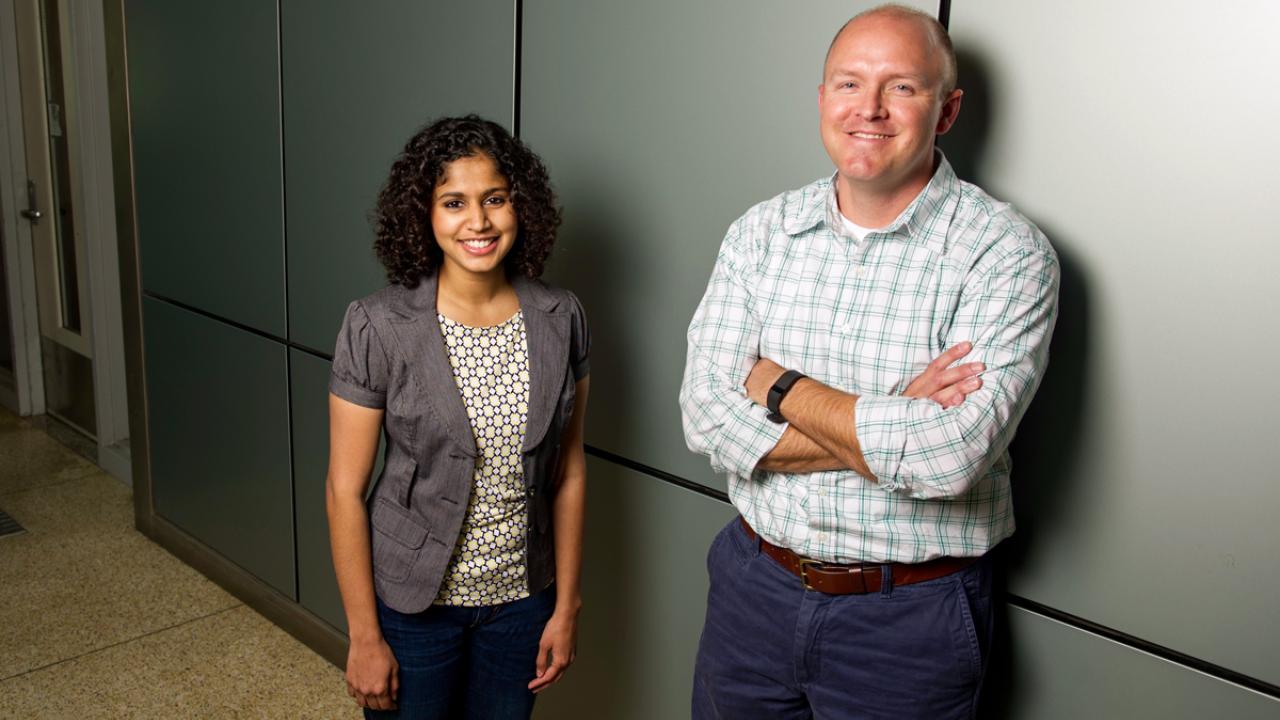
Mentoring Fellowship Awardees - Dr. Kent Leach and Mentee Debika Mitra, Biomedical Engineering
What makes Dr. Kent Leach a great mentor?
Quick Summary
- His personal experience navigating his own way drives his interest in mentoring others.
Kent Leach, professor in the Departments of Biomedical Engineering (BME) and Orthopedic Surgery, was a first-generation college student. He remembers the struggle to find guidance throughout his developing academic career. “To this day, my parents still scratch their head as to why I turned down jobs after graduating from college, much less pursue graduate school and a postdoc,” he says. “I was certainly learning what I wanted as I went along.”
His personal experience in navigating his own way drives his interest in mentoring others at all levels, and the valuable tools from the Mentoring at Critical Transitions (MCT) program improve his ability to do so.
Leach, also the chair of the BME graduate group, experienced early success with mentoring a former BME student whose average academic performance was outshined by ambition, personality and potential. Leach provided opportunities that eventually put this student on a path to a PhD, medical school, and a decorated career in research.
But he is always searching for strategies to improve the students’ learning experience. Particularly with the composition of the BME graduate group, which includes over 80 faculty members, students can face a wide variety of opportunities—great for students who have definitive ambition, but less beneficial for those without clear direction and who may flounder without a clear goal.
Leach’s proposal, “Active strategies for student integration into research environments in graduate school,” with his mentee Debika Mitra, earned one of the first five MCT fellowships to be offered.
“It’s critical to have many mentors with different backgrounds and experiences, and who are both more advanced and more junior in your professional development,” he says. “MCT was designed to help students learn more about our faculty, hopefully resulting in earlier pairing with a major professor, establishment of a mentoring team that pushes the student to make strong contributions to the field, and improved knowledge of the wealth of resources to assist in their research.”
Leach intends to take a long view of the program, gathering data and employing a database to track students and leverage existing mechanisms, such as the Graduate Studies annual progress reports, to study productivity and progression through the program. He expects that improving certain milestones—i.e., reducing TTD (time to degree) while increasing productivity, as well as building relationships between cohorts—will result in a more impactful degree program.
Mitra, a fourth-year PhD student in the Leach Laboratory and currently the president of the graduate student group, was a natural choice as a mentee for Leach. They met first in 2011 during a summer undergraduate research program. Mitra was so enthusiastic about his work in bone tissue engineering that she reached out to Leach when she applied to the PhD program. “I strongly believe that a graduate student's success is directly related to having a mentor that will guide you through the roller coaster of graduate school,” Mitra says. She credits Leach with his valuable suggestions and comments on works such as abstracts, manuscripts and fellowship applications, which enabled her to win multiple fellowships as well as become a better writer.
Particularly significant was his support of a well-rounded education outside of the research laboratory. “As an undergraduate, I was always involved in outreach activities and student organizations, but I’d heard that most advisors want students to focus 125% of their efforts on research in graduate school,” she explains. One of her endeavors was the UC Davis program called English for Science and Technology (EST), where Mitra taught a group of Japanese students about the various biotechnology-related research on campus and accompanied them on site visits—bringing the mentorship relationship full circle.
“She has always had a strong commitment to outreach and mentoring others, and she knows the value of input and support from others,” Leach says.

